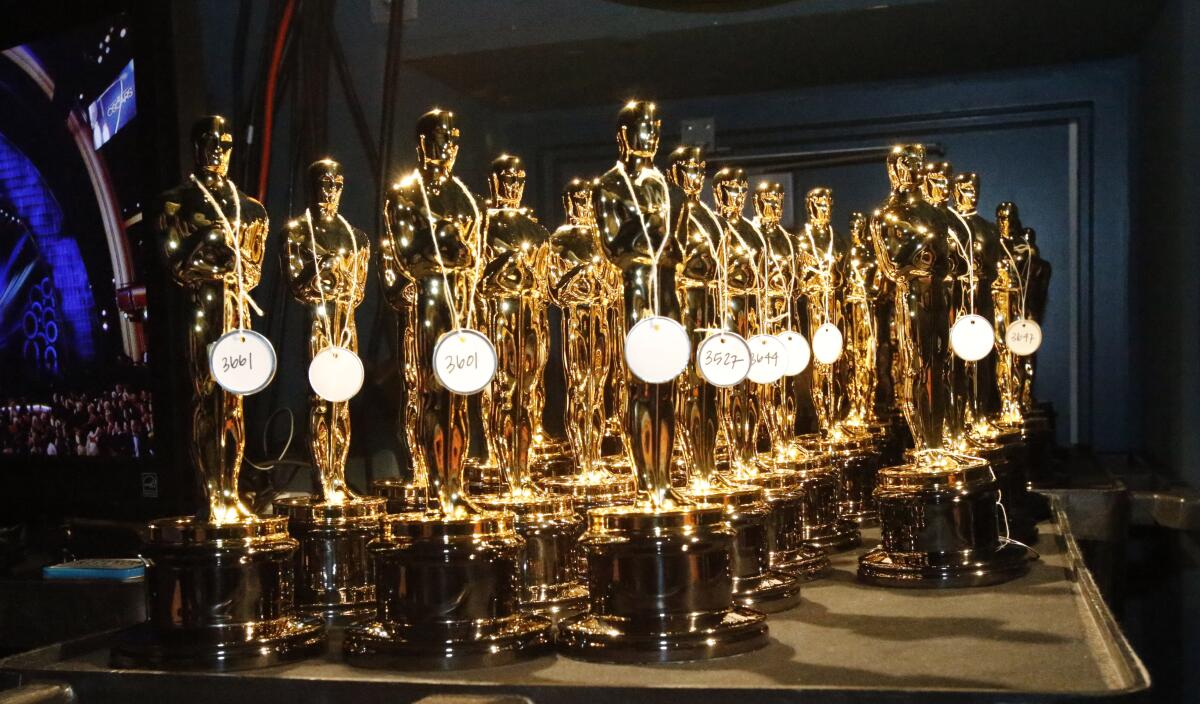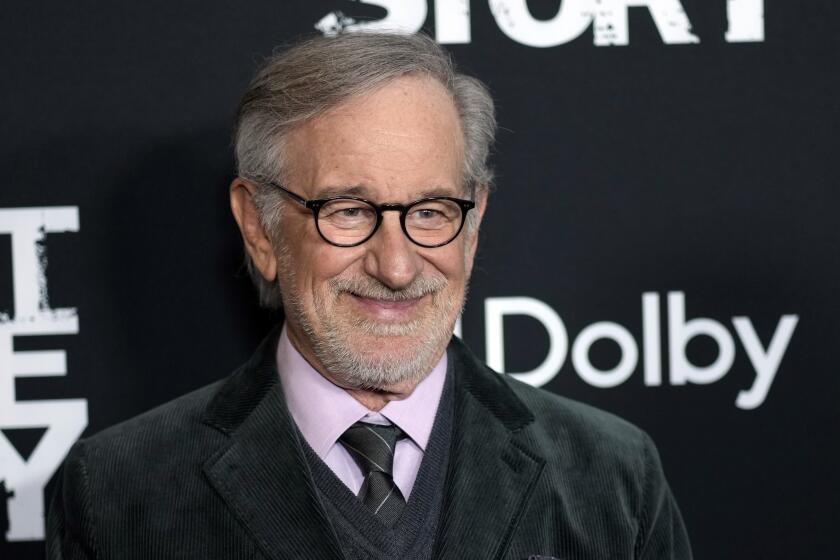Over 70 Hollywood heavy-hitters slam controversial Oscar changes in open letter

With the Academy Awards less than three weeks away, more than 70 prominent film professionals — including Oscar winners James Cameron, Kathleen Kennedy, John Williams and Guillermo del Toro — issued a letter Wednesday urging the academy to reverse a controversial plan they argue would relegate some nominees to “the status of second-class citizens.”
Addressed to academy President David Rubin, the letter argues that the decision announced last month to hand out five below-the-line awards and the three short film awards in the hour before the Oscars telecast would do “irreparable damage” to the Oscars’ reputation by “demeaning the very crafts that, in their most outstanding expressions, make the art of filmmaking worthy of celebration.”
The letter is the latest in a string of criticisms of the move from various guilds, industry groups and academy members as well as a number of this year’s nominees, including Jane Campion and Steven Spielberg.
According to the plan, winners’ acceptance speeches for the eight affected categories — film editing, makeup and hairstyling, original score, production design, sound, documentary short subject, animated short and live-action short — will be edited to highlight the most emotional moments, with the clips then incorporated into the live broadcast.
It’s a thrill just to be nominated. Even when your category has been bumped off the live show.
Nearly half of the signers of the new letter are film composers, including numerous Oscar winners like Alexandre Desplat, Howard Shore, Hildur Guðnadóttir and Williams, who holds the record for the most nominations for any living person with 52.
“Critical artistic crafts like music scoring, film editing, production design, makeup, hairstyling and sound will always deserve the same respect and recognition as crafts like acting, directing and visual effects,” the letter reads.
Rubin and academy Chief Executive Dawn Hudson have defended the move, saying that all honorees will be treated with respect. “I can’t imagine that we’re not going to deliver the Oscar experience that both the nominees and the audience have been wanting and are dreaming about,” Rubin told Deadline in an interview last week. “We feel really good about this plan. It feels inclusive and respectful and celebratory.”
Even as the controversy continues to swirl, plans are moving ahead for the show. On Wednesday, ABC released its first promo for the telecast featuring this year’s trio of hosts, Amy Schumer, Regina Hall and Wanda Sykes.
Academy leaders have suggested they felt compelled to make difficult changes this year to safeguard the future of the Oscars, which plummeted to record-low ratings with last year’s pandemic-dampened show. “We must prioritize the television audience to increase viewer engagement and keep the show vital, kinetic, and relevant,” Rubin wrote in his Feb. 22 letter to academy members announcing the change.
Hollywood’s big dogs are barking about changes to the Oscars, including best picture nominees Steven Spielberg, Jane Campion and Denis Villeneuve.
That argument has received fierce pushback, however, with many academy members and cinema lovers insisting that the Oscars represent more than just a TV show and that attempts to pander to a wider audience undermine the very art form they are meant to celebrate. Some say the academy’s new fan favorite award — in which regular moviegoers vote for their favorite film of 2021 via Twitter, with the winner announced on the show — only rubs salt into the wound. (The online contest is not an official category, and the winner will not receive an Oscar.)
“To diminish any of these individual categories in the pursuit of ratings and short-term profits does irreparable damage to the Academy’s standing as impartial arbiters and responsible stewards of our industry’s most important awards,” the letter reads.
In 2018, the academy announced a similar plan to shift four award presentations off the live show, only to scrap the idea shortly before the 2019 Oscars in the wake of industry pushback. But this year, with ABC pressuring the academy to make what the network deems overdue changes to the often bloated telecast, it appears less likely that the organization will reverse its decision.
”We just had to make changes,” Hudson told Deadline last week. “We had to look [out] for the future for this show and for the organization. Is this the right answer? I don’t know. We need to try this, assess, and move forward.”
The full letter is below:
Dear President Rubin:
We the undersigned urge you in the strongest possible terms, along with your colleagues on the Awards Committee, to reverse your decision to remove the presentation of eight awards categories from the live telecast of this year’s Academy Awards ceremony, including Best Original Score, Film Editing, Production Design, Makeup and Hairstyling, Sound, Documentary Short Subject and both Live Action and Animated Short Film.
For nearly a century, the Academy Awards has represented the gold standard in recognizing and honoring all of the essential crafts in filmmaking. Now, as we approach the Oscars’ 100th year, we are deeply troubled that this gold standard is being tarnished by valuing some filmmaking disciplines over others and relegating those others to the status of second-class citizen. Critical artistic crafts like music scoring, film editing, production design, makeup, hairstyling, and sound will always deserve the same respect and recognition as crafts like acting, directing, and visual effects. To diminish any of these individual categories in the pursuit of ratings and short-term profits does irreparable damage to the Academy’s standing as impartial arbiters and responsible stewards of our industry’s most important awards.
Seeking new audiences by making the telecast more entertaining is a laudable and important goal, but this cannot be achieved by demeaning the very crafts that, in their most outstanding expressions, make the art of filmmaking worthy of celebration.
Sincerely,
Peter Baert
Bruce Berman
Volker Bertelmann
Terence Blanchard
Scott Bomar
Nicholas Britell
James Cameron
Milena Canonero
John Corigliano
John Debney
Guillermo del Toro
Alexandre Desplat
Ramin Djawadi
Amie Doherty
Tan Dun
Laura Engel
Bruce A. Evans
Sven Faulconer
George Fenton
Dante Ferretti
Simon Franglen
Raynold Gideon
Michael Gorfaine
Peter Gregson
Dave Grusin
Trevor Gureckis
Hildur Guðnadóttir
Alex Heffes
Nate Heller
David Hirschfelder
Natalie Holt
James Newton Howard
Steve Jablonsky
Jónsi
Federico Jusid
Jan A.P. Kaczmarek
Kathleen Kennedy
Geoffrey Kirkland
Philip Klein
Maria Machado
Patty Macmillan
Judianna Makovsky
Richard Marvin
Nami Melumad
Robert Messinger
Thomas Newman
David Newman
Anne Nikitin
Dustin O’Halloran
Atli Örvarsson
John Powell
Steven Price
Michael Rosenberg
Joe Roth
Sam Schwartz
Lisbeth Scott
Theodore Shapiro
Howard Shore
Alan Silvestri
Sam Slater
Alex Somers
Dante Spinotti
Herdís Stefánsdóttir
Vittorio Storaro
Tamar-kali
Dean Tavoularis
Fernando Velázquez
Chris Walden
Chris Westlake
Nathan Whitehead
John Williams
Andrew Zack
Lili Fini Zanuck
More to Read
Only good movies
Get the Indie Focus newsletter, Mark Olsen's weekly guide to the world of cinema.
You may occasionally receive promotional content from the Los Angeles Times.













